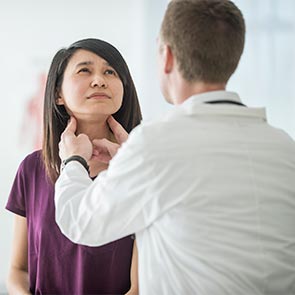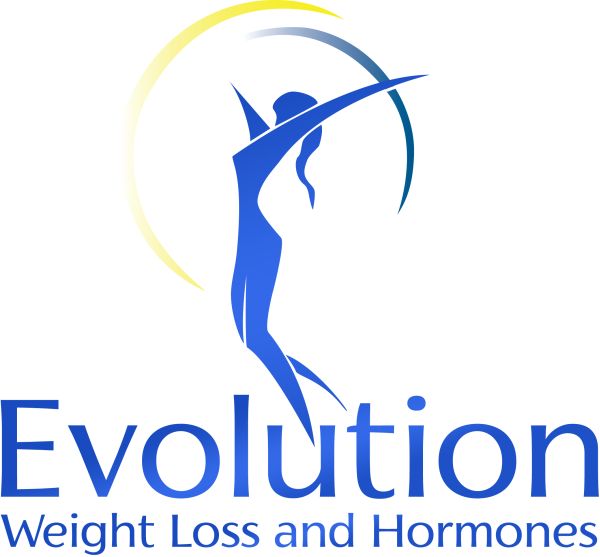De Quervain's Thyroiditis Treatment in Saint Leo, FL

Do you have pain in your throat, jaw, or ear, along with fever and fast heartbeat? It may be de Quervain's thyroiditis (also called subacute thyroiditis), a rare disorder that affects your thyroid gland. Seeking medical attention is very important because this condition can cause serious complications that may become permanent if left untreated.
To speak with a subacute thyroiditis specialist today in Saint Leo, call (813) 536-3212 or contact Erin Bolton online.
What are the symptoms of de Quervain's thyroiditis?
Thyroiditis is the medical term for inflammation of the thyroid, a butterfly-shaped gland located near the base of your throat. This gland produces hormones that control your growth and metabolism and affect your heart rate and body temperature. Symptoms fluctuate between those of hyperthyroidism and hypothyroidism.
There are four phases of de Quervain's thyroiditis, each lasting about four to six weeks:
- acute phase: presents with thyroid pain and hyperthyroidism
- transient asymptomatic phase: your thyroid hormone levels return to normal
- hypothyroid phase: your thyroid hormone levels drop
- recovery phase: your thyroid hormone production and regulation returns to normal
De Quervain's thyroiditis symptoms are primarily a fever, along with pain in the neck, jaw, or ear that can last for 1-3 months. Your thyroid may also be swollen and tender to the touch. Subacute thyroiditis can also cause symptoms of hyperthyroidism like:
- anxiety
- difficulty concentrating
- insomnia
- rapid heartbeat
- weight loss
- heat intolerance
- irritability
- tremors
In the final stage of the condition, symptoms of hypothyroidism can include:
- fatigue
- hair loss
- cold intolerance
- constipation
- heavy menstrual periods
- depression
What causes de Quervain's thyroiditis?
The exact causes of subacute thyroiditis are unknown. There are four different subtypes of subacute thyroiditis, each differing in possible cause:
- subacute granulomatous thyroiditis: the most common type of subacute thyroiditis is caused by viral infections like measles, influenza, adenovirus, the common cold, and mumps
- post-partum thyroiditis: occurs in women have an underlying, inflammation-causing autoimmune disease within one year of giving birth; usually resolves within 18 months
- subacute lymphocytic thyroiditis: also occurring after childbirth, though hyperthyroid symptoms develop earlier, with hypothyroid symptoms lasting several months after
- palpation thyroiditis: occurs when the thyroid is damaged from repeated procedures like gland examination or surgery
Women are more likely to get de Quervain's thyroiditis then men. It usually affects individuals in their 20s to 50s.
How is de Quervain's thyroiditis diagnosed?
A blood test is used to make a subacute thyroiditis diagnosis. This test measures your T4 thyroid hormone and thyroid stimulating hormone (TSH) levels. In the early stages of the disease, your T4 levels will be higher than your TSH. In the later stages, your TSH levels will be high while your T4 levels will be low.
Other blood tests that can diagnose de Quervain's thyroiditis include:
- radioactive iodine uptake: measures how much radioactive iodine is taken up by your thyroid gland; lower-than-normal uptake may indicate subacute thyroiditis
- thyroglobulin: this serves as the source of T4, and levels increase with subacute thyroiditis
- erythrocyte sedimentation rate (ESR): measures how much inflammation is in your body
In some cases, a biopsy may be done to take a sample of thyroid tissue for laboratory testing.
How is de Quervain's thyroiditis treated?
The goal of de Quervain's thyroiditis treatment is to reduce pain and treat hyperthyroidism until it resolves.
Pharmaceuticals
Pain results when your nerves send an electrical signal to your brain. When you get injured, the damaged tissue releases chemicals called prostaglandins, which are like hormones and cause tissue to swell, intensify the electrical signal coming from the nerves, increasing pain.
These electrical signals can be disrupted by nonsteroidal anti-inflammatory drugs (NSAIDs) like ibuprofen and aspirin which control pain and reduce inflammation and pain.
Anxiety, shaking, and irregular heartbeat can be treated with beta blockers, which blocking the effects of the hormone epinephrine (adrenaline).
Cortisone is a steroid that reduces inflammation by preventing infection - fighting white blood cells, polymorphonuclear leukocytes, from traveling to the area of swelling.
Prednisolone is the most commonly used corticosteroid to treat subacute thyroiditis. A recent study suggests that 20mgs of prednisolone daily tapered over four weeks is enough to treat the condition.1
However, long term corticosteroid use can reduce or stop the secretion of TSH, reducing thyroid hormone levels in the body, leading to hypothyroidism.
Corticosteroids are artificial steroid hormones, so they can also affect you adrenal glands, which secrete cortisol, your natural steroid. Corticosteroids compete with your natural steroid hormone cortisol, suppressing the adrenal glands. Artificial steroid hormones don't function the same way as natural cortisol, and can induce harmful side effects like:
- loss of calcium of the bone, leading to osteoporosis
- menstrual problems
- cataracts
- intensification of diabetes
Hormone replacement
Thyroid hormone replacement treatment is a prescription medication to replace the missing thyroid hormone that your body is unable to produce on its own. These include synthetic versions of the thyroid hormone levothyroxine (known as T4), the hormone triiodothyronine, and the T3 hormone, called liothyronine.
Natural desiccated thyroid, sometimes called NDT is prepared from the desiccated (dried) thyroid glands of pigs and are sometimes called porcine thyroid.
Bioidentical hormones are derived from natural plant sources, such as yams or soy, to produce molecules that are physiologically similar to the hormones made by the human body, like thyroid hormone.
Bioidentical hormone therapy can be adapted to your individual body and hormonal needs. Bioidentical hormones are available in a variety of strengths and dosages. A custom-made formula can be created for just the right amount that you need, so long term side effects are less common.
Nutritional and supplement treatment
- green tea and lemon balm infusion: antioxidants that boost your immune system
- bugleweed: may reduce your body's production of thyroid hormone and the hormone prolactin
- motherwort: may reduce inflammation and have antioxidant effects
- olive leaf extract: contain the antioxidants oleuroside and oleoside
- St. John's Wort: contains hyperforin and adhyperforin acting on chemical messengers in your nervous system that regulate mood
- zinc: a trace element required for the production of T4 and conversion to the active form of thyroid hormone known as T3; enters your cells and fires up the energy-producing parts of your cell known as mitochondria; zinc is required for healthy T3 receptors in your cells so even if you have enough T3, it won't work optimally if you are deficient in zinc
- vitamin C: boosts your immune system by helping your body make white blood cells
- propolis (organic material found in beehives): contains more than 300 polyphenols, antioxidants that fight disease
Acupuncture
According to the World Health Organization, several studies suggest that acupuncture and TCM can be beneficial in treating hypothyroidism
Practitioners stimulate "bioelectrons" which move along the energy pathways (meridians). External factors (such as diet and physical injury) and internal factors (such as emotional states, mental stimulation, and hereditary conditions) can affect bioelectrical movement in the body and cause an imbalance of electrons at the cellular level.
Each acupuncture point, which shows up in different colors from surrounding tissue on infrared imaging photos, has a function. These acupuncture points have high concentrations of nerve endings and bundles, mast cells (used for immune function) lymphatics and capillaries. They also have a lower electrical resistance than surrounding skin.
For example, MRIs have demonstrated that stimulating LI 4 (large intestine 4) releases endorphins (natural pain killers). Points GV7, KD7, SP6 have been stimulated to resolve thyroid imbalance on a cellular level.
As with any treatment, results will vary from patient to patient, depending on age, genetics, environmental conditions, and other health factors. While the disease usually doesn't cause any long-term health concerns, the American Thyroid Association estimates that about 5% of patients may develop permanent hypothyroidism and require medication to keep their thyroid hormones stable.
Reserve Your Appointment Now
Though de Quervain's thyroiditis can disrupt hormone levels and cause temporary pain and thyroid problems, treatment options are numerous and the condition rarely creates any long-lasting complications.
If you are experiencing subacute thyroiditis symptoms, speak with a thyroid specialist in Saint Leo today by calling (813) 536-3212 or contact Erin Bolton online.
1. Koirala, Krishna Prasad, and Vishal Sharma. "Treatment of Acute Painful Thyroiditis with Low Dose Prednisolone: A Study on Patients from Western Nepal." Journal Of Clinical And Diagnostic Research, 2015, doi:10.7860/jcdr/2015/14893.6427.
Evolution
Address
4691 Van Dyke RoadLutz, FL 33558
(813) 536-3212
www.evolution4health.com
Hours
Mon:
10:00 am - 4:00 pm
Tue:
10:00 am - 4:00 pm
Wed:
10:00 am - 5:00 pm
Thu:
10:00 am - 6:00 pm
Fri:
10:00 am - 3:00 pm
Sat:
Closed
Sun:
Closed


